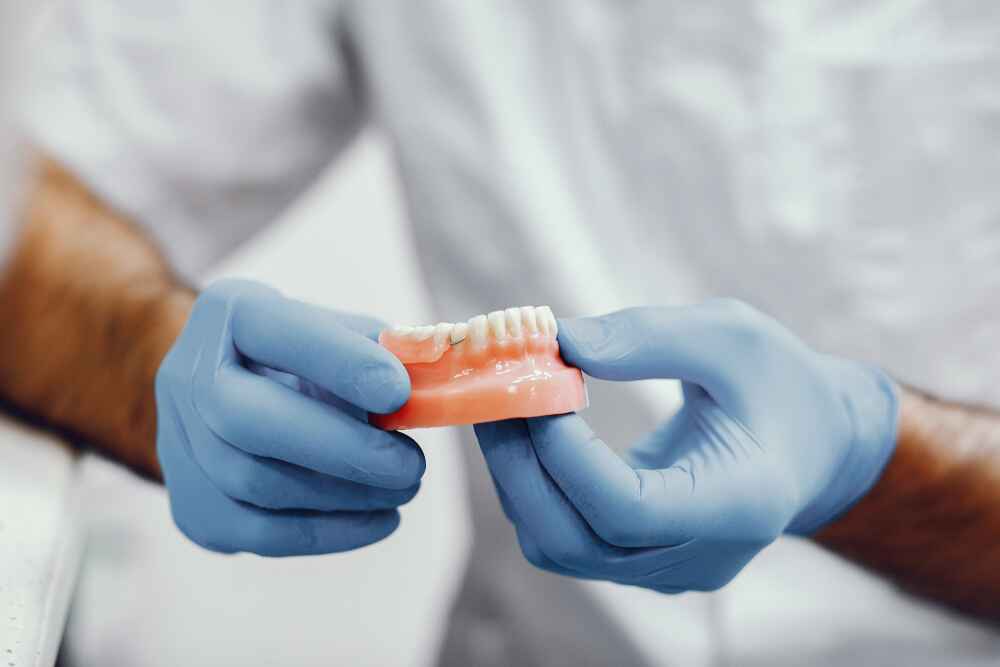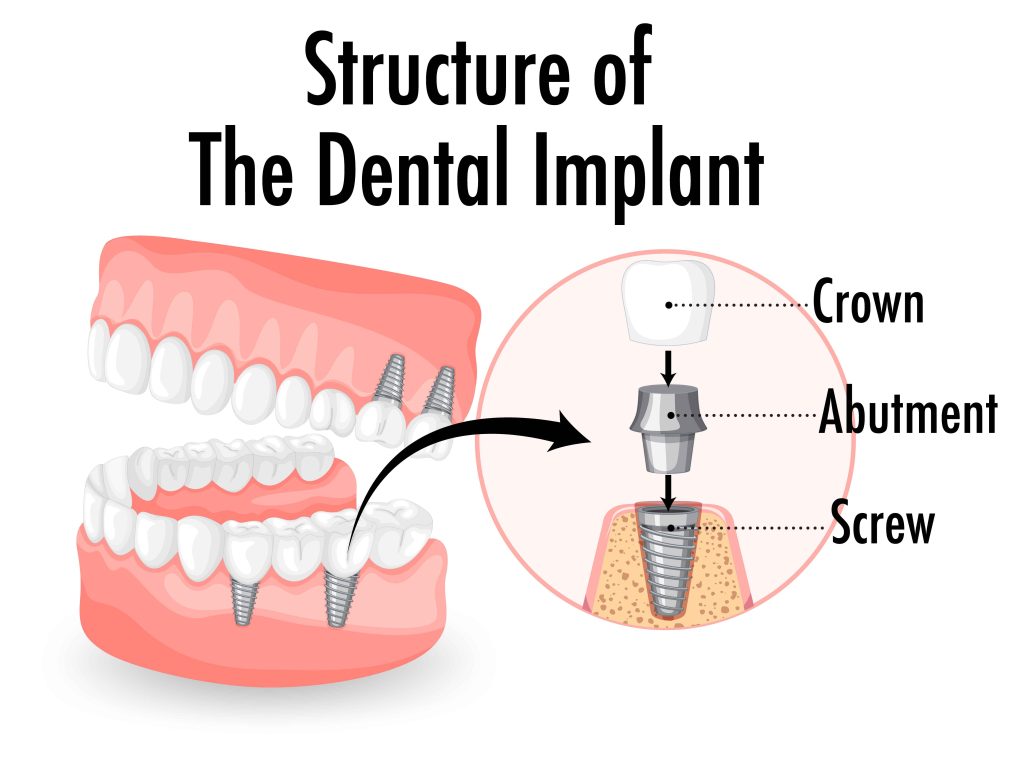At Reflections Dental Care, we know that dental implants are an excellent solution for those looking to replace a missing tooth or teeth. One component that plays a crucial role in this procedure is the abutment. While the term “abutment” might sound a bit technical, it’s a vital part of the dental implant system that ensures your new tooth functions and looks just like your natural one.
What is an Abutment in Dental Implants?
An abutment in dentistry refers to a small connector piece that is attached to the dental implant. After the implant is placed into the jawbone and has fully healed, the abutment is connected to the top of the implant. This connector serves as the link between the implant (the artificial tooth root) and the crown or bridge that will replace the missing tooth. The abutment holds the replacement tooth securely in place and ensures it functions just like a natural tooth.
In simple terms, think of the implant as the root of the tooth, the abutment as the connector, and the crown or bridge as the visible tooth. Together, they create a complete, functional restoration.
Need for Abutment in Dental Implant
Dental implants offer a long-lasting and effective solution for replacing lost teeth, but it’s not just about placing a new tooth. It’s about ensuring that the new tooth functions, looks, and feels like the original one. This is where the abutment plays a key role.
Without the abutment, there would be no way to attach the final restoration (crown or bridge) to the dental implant. The abutment is what ensures the artificial tooth stays firmly in place. Additionally, it acts as a stabilizing force for the implant, ensuring that the forces from biting and chewing are properly distributed. If the abutment weren’t in place, the replacement tooth wouldn’t function well and could even fail over time.
Not only does the abutment provide the necessary structure for the restoration, but it also helps guide the healing process of the gums and ensures that the final crown looks natural and fits well with your surrounding teeth.
If you’re looking for professional care and guidance on dental implants in OKC, our team of dentists in Oklahoma City, OK, is here to help you every step of the way, ensuring that your new smile functions beautifully and looks great.
Materials Used for Abutments

Abutments can be made from different materials, each with its own unique advantages. The most common materials used for dental abutments are titanium, zirconia, and ceramic. Let’s take a closer look at each one:
- Titanium: Titanium is the most commonly used material for dental abutments. It is incredibly durable, strong, and biocompatible, meaning it is well-tolerated by the body and won’t cause adverse reactions. Titanium is also the material used in the implant itself, so using it for the abutment ensures consistency and stability. Its strength makes it a great choice for back teeth, where the forces of chewing are greater.
- Zirconia: Zirconia is a tooth-colored material, which makes it an excellent option for people who are looking for a more aesthetic result, especially for implants placed in the front of the mouth. Zirconia abutments provide both strength and beauty, as they blend seamlessly with natural teeth. However, zirconia is less flexible than titanium, which can make it more prone to breakage under excessive pressure.
- Ceramic: Like zirconia, ceramic abutments are designed to offer aesthetic benefits. They are often used in cases where the patient has a thin gum line or the implant is in a highly visible area. Ceramic abutments are less likely to show through the gums compared to metal abutments, providing a more natural appearance.
Each material offers distinct benefits depending on the location of the implant and the patient’s specific needs. Your dentist will choose the best material for you based on factors like tooth location, gum health, and aesthetic goals.
Impacts on Aesthetics and Function
The abutment has a significant influence on both the aesthetic and functional aspects of your dental implant.
- Aesthetic Impact: The abutment plays a vital role in how the final tooth looks. A custom-made abutment ensures that the restoration fits perfectly and aligns well with the surrounding teeth. It helps to create a natural, seamless look, especially when the implant is placed in the front of the mouth. The choice of abutment material also affects the final appearance. For example, zirconia and ceramic abutments are favored for their natural tooth-like color, whereas titanium abutments are more visible under the gum tissue but are still highly durable.
- Functional Impact: In terms of function, the abutment ensures that the prosthetic tooth stays securely in place while allowing you to chew, speak, and smile comfortably. It also helps distribute the pressure from biting and chewing evenly to prevent the implant from becoming loose or damaged. The stability and proper fit of the abutment are essential for ensuring that the implant performs just like a natural tooth.
Why Proper Abutment Selection and Placement is Important
Choosing the right abutment material and ensuring that it is placed correctly are critical to the long-term success of your dental implant. Here’s why:
- Fit and Comfort: If the abutment is not properly selected or placed, it could result in a poor fit, which can lead to discomfort or difficulty chewing. A well-placed abutment ensures that the restoration feels comfortable and functions properly.
- Longevity and Durability: A properly chosen abutment helps ensure that your implant lasts for years. If an incorrect material is chosen or the abutment is improperly placed, it could weaken the bond between the implant and the restoration, leading to potential failure over time.
- Aesthetic Results: An abutment that is well-designed and made from the right material ensures that the final restoration looks natural. The abutment helps the restoration blend in with your surrounding teeth, creating a beautiful, seamless smile.
- Prevention of Complications: Improper abutment placement can lead to complications, such as gum irritation, implant failure, or damage to the surrounding teeth. It is essential that your dentist carefully plan the abutment’s placement to avoid these issues.
At Reflections Dental Care, we take great care in selecting the appropriate abutment material and ensuring it is placed with precision to give you the best possible result. Your comfort, function, and the appearance of your implant are our top priority. Contact us online or call us at (405) 751-4556 for a consultation.
FAQS
1. What is a dental abutment?
A dental abutment is a connector that attaches a dental implant to the final restoration, such as a crown or bridge.
2. When is a dental abutment placed?
The abutment is usually placed after the implant has healed and fused with the bone, typically a few months after implant surgery.
3. Is placing an abutment painful?
The procedure is usually done under local anesthesia and involves minimal discomfort.
4. What is the difference between an abutment and a crown?
The abutment is the connector piece, while the crown is the visible part of the tooth that attaches to the abutment.
5. How long after the abutment is the crown placed?
Typically, 1–2 weeks after the abutment is placed, the crown can be attached, depending on healing and customization.
6. What is a healing abutment?
A healing abutment helps shape the gum tissue and protects the implant site during healing.
7. Can an abutment be replaced if damaged?
Yes, if an abutment becomes loose or damaged, it can usually be replaced without removing the implant.


